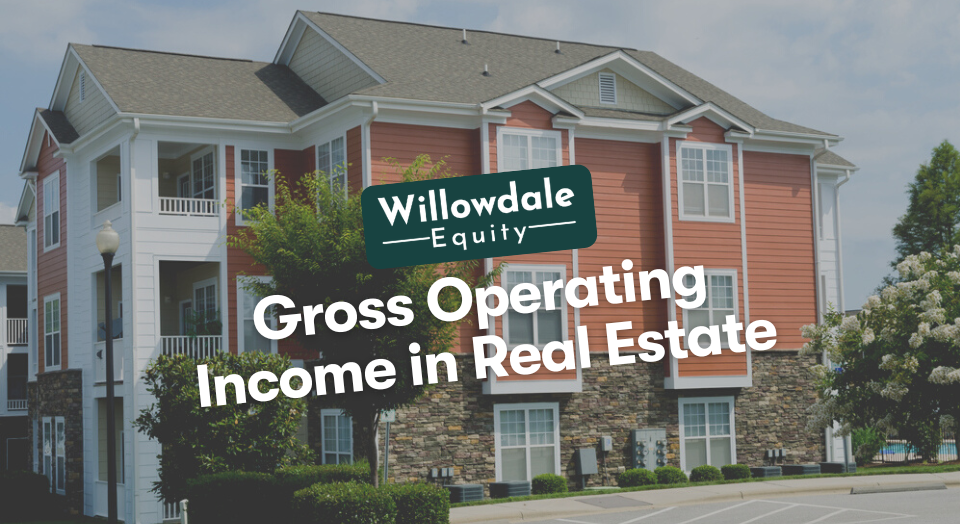
What is Gross Operating Income in Real Estate?
This article is part of our guide on what a good cap rate is for multifamily, available here.
When investing in real estate, it’s important to understand income and expenses. Without a thorough understanding of net and effective gross income, you will struggle to make informed investment decisions and expose yourself to unnecessary risk. This lack of knowledge will cause problems. Just because a property generates a certain amount of revenue doesn’t mean that said revenue will translate into a profitable investment.
This is one of many rental income metrics, but it is essential to maximize it so that the income after expenses remains high.
Key Takeaways
-
Its a property’s effective gross operating income is the total revenue generated before taxes and expenses.
-
When you’re operating a multifamily property, there will be many recurring expenses to keep everything running smoothly. Some costs are apparent; utilities for the common areas of the building, landscaping, cleaning, and property management fees.
-
Once you’ve received your gross operating income and paid your recurring expenses, you’re left with the property’s net operating income. Note that both GOI and NOI are pre-tax.
What is Effective Gross Operating Income?
A property’s effective gross operating income is the total revenue generated before taxes and expenses. If you have a multifamily property, everything you receive from your tenants goes toward this amount. This amount, however, isn’t the same as what the property could be making.
For example, if you have a vacancy, you would not include the gross potential income you would collect if the unit were occupied in your GOI calculations.
Let’s look at an example of a multifamily’s gross operating income in action.
Gross Operating Income Example with Multifamily
Let’s say you’re buying a 10-unit multifamily building and trying to calculate gross operating income for the complex. 9 of the 10 apartment units are occupied and are generating rent. Each tenant is paying $1,000/month. This property’s gross operating income is $9,000 per month or $108,000 per year. Does that mean this property is making you over $100,000 in profit annually? No!
Once you collect this money, you have to pay your expenses, which, as you may imagine, will eat into this sum considerably.
This is when it is essential to understand net operating income.
Gross Operating Income (GOI) vs Net Operating Income (NOI)
Once you’ve received your gross operating income and paid your recurring expenses, you’re left with the property’s net operating income. Note that both GOI and NOI are pre-tax.
The only tax-related metric included in the net operating income is the property taxes that are paid to the county, not your income taxes. Many believe that the property’s NOI is the same as the profit. This is not the case unless you can avoid tax and debt service entirely.
What are Operating Expenses in Real Estate
When you’re operating a multifamily property, there will be many recurring expenses to keep everything running smoothly. Some costs are apparent; utilities for the common areas of the building, landscaping, cleaning, and property management fees.
What may not be so obvious are certain hidden expenses. These include pest control, security, legal, and accounting fees. Other services like cleaning the rental property and lawn care may also be included as long as they are recurring. These services might be afterthoughts to first-time operators, so it’s essential to understand how great the scope of running a property may be.
Understanding the different kinds of expenses in real estate is essential when selecting properties.
Frequently Asked Questions About What is GOI in Real Estate
The GOI, or gross operating income, is a property’s total revenue before expenses. This revenue does not include potential revenue from vacancies but includes revenue from other income generated by the property, such as storage units.
GOI stands for gross operating income. This is the income a property generates before taking recurring operating expenses into account.
What Does GOI Mean - Conclusion
Now that you understand gross operating income, you’ll be able to apply it effectively when making investing decisions. Banks will often look at a property’s gross operating income when determining how much financing to provide while managing risk. They will also ensure you understand this metric if you don’t have many completed deals.
A property’s GOI will also affect its valuation, so it’s essential to understand that relationship.
If you want to learn more about investing in real estate, network with other real estate investors, and get access to exclusive deals, consider joining the investor club.
Sources:
- Investopedia, “Net Operating Income (NOI)“
Interested In Learning More About PASSIVE Real Estate Investing In Multifamily Properties?
Get Access to the FREE 5 Day PASSIVE Real Estate Investing Crash Course.
In this video crash course, you’ll learn everything you need to know from A to Z
about passive investing in multifamily real estate.
We’ll cover topics like earned income vs passive income, the tax advantages, why multifamily, inflation, how syndications work, and much much more!




